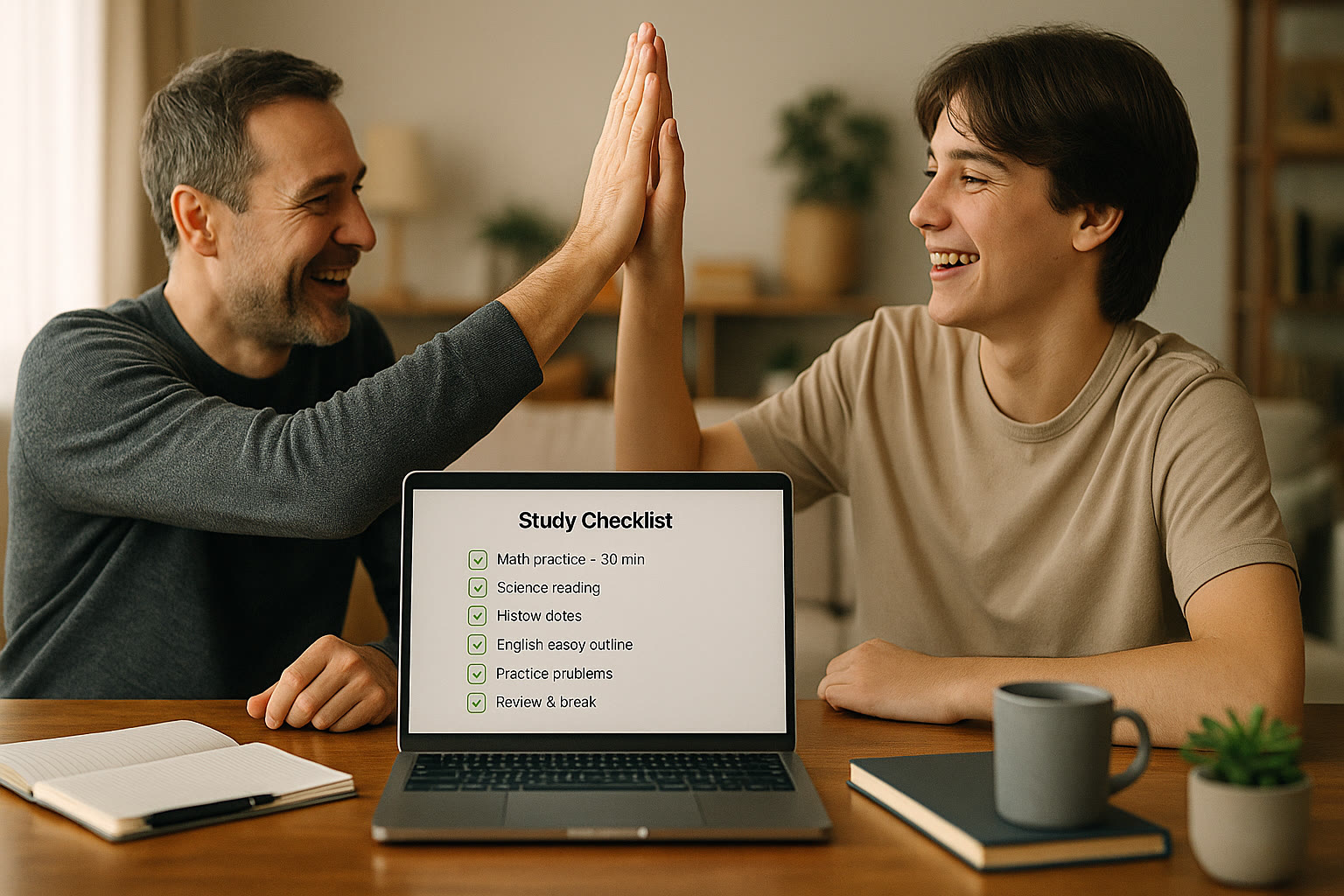Why Accountability Matters — And Why Nagging Backfires
There’s a thin line between being a supportive parent and being a professional-level reminder machine. When it comes to the Digital SAT and the college application process, what teens need most is consistent support, not constant prodding. Accountability—when done with respect, clarity, and empathy—turns anxious procrastination into calm progress. Nagging usually does the opposite: it erodes trust, increases stress, and makes teens hide their real concerns.
This guide is written for parents and guardians who want to be effective partners in their teen’s SAT journey without damaging the relationship. It draws on practical methods, everyday psychology, and the realities of the Digital SAT era. You’ll find hands-on strategies you can begin using this week, sample schedules, communication scripts, and ways to use modern supports—like personalized tutors and data-driven study plans—so accountability becomes a natural part of your family routine.
Start With Mindset: The Foundation of Positive Accountability
Before you set up calendars, trackers, or rewards, take a breath. Your mindset will shape how your teen experiences every step of preparation.
From “You must” to “We’ll try”
Reframe expectations as shared experiments. Instead of saying, “You must study two hours every night,” try: “Let’s try a study rhythm for two weeks and see what feels sustainable.” This turns accountability into a testable plan rather than a demand.
Empathy beats enforcement
Recognize the competing pulls on a teen’s attention: classes, activities, friendships, mental health, social media, and early application tasks. When you acknowledge those pressures, teens feel understood—and they’re more likely to accept guidance.
Practical Tools to Build Accountability (Without Nagging)
These are concrete systems you can implement immediately. Pick one or two and try them consistently for at least two weeks.
1. The Contract of Collaboration
Create a short, positive agreement in plain language. This isn’t legal paper—just 6–8 lines describing what you and your teen will do and what kind of support they want.
- Sample line: “I’ll study 45 minutes, four times a week, and check in once a week to reflect.”
- Sample line: “I’ll help by removing distractions during study time and offering one practice test per month.”
- Include what will happen if the plan needs to change (revisit together, no blame).
2. Micro-Rituals that Replace Nagging
Rituals are tiny acts that signal commitment without debate. They can be as simple as:
- Five-minute end-of-day check-ins (what went well, what to change).
- “Study start” routines: a warm drink, headphones on, phone in another room.
- Weekly planning sessions—15 minutes on Sunday to schedule study blocks and commitments.
3. Visible, Gentle Tracking
Tracking doesn’t need to be public shaming. The goal is clear information so you both can make smarter decisions.
- Color-coded calendars: green = completed, yellow = partial, gray = skipped.
- Small progress journals: a single line after each study session—”What I learned”—to build momentum.
- Digital habit apps that send a celebratory ping when streaks grow. (Let your teen choose the app.)
4. Break Tasks into True Micro-Steps
“Study for SAT” is too vague. Break it down into manageable, 20–45 minute tasks focused on a clear outcome.
- 20 minutes: vocabulary flashcards for a theme (science words, transition words).
- 30 minutes: one math concept with 6 practice problems (e.g., linear equations).
- 45 minutes: one Reading passage with targeted annotation strategy.
Communicating So Teens Listen
Words have power. Here are scripts and techniques that help you influence without nagging.
Try the 3-Part Check-In
This short structure keeps conversations focused and non-judgmental.
- Observe: “I noticed you skipped two study sessions last week.”
- Ask: “Is something getting in the way, or should we adjust the plan?”
- Solve together: “What’s one small change that would help?”
Use Choice to Increase Buy-In
People own what they select. Offer choices instead of making demands.
- “Would you rather do math in the morning or right after school?”
- “Do you prefer a 30-minute focused sprint or two 20-minute sessions?”
Designing a Week That Works: Sample Schedules
Below are two model schedules you can adapt: for busy athletes/activists and for students with a heavier academic load. The schedules emphasize small, consistent practice and a weekly review to keep accountability alive without pressure.
| Plan | Mon–Fri (Sample) | Saturday | Sunday |
|---|---|---|---|
| Busy Student (sports/arts) |
|
|
|
| Academically-Heavy Student |
|
|
|
When to Step In—and When to Step Back
Knowing the difference between helpful involvement and helicoptering is a skill. Here’s a quick guide.
Step In When:
- Deadlines are being missed repeatedly and the teen asks for help.
- Results show a pattern of misunderstanding a core skill (consistent errors on algebra, for example).
- Stress, sleep loss, or mood changes suggest the student’s well-being is at risk.
Step Back When:
- The student can self-manage assignments, even if imperfectly.
- They are practicing accountability strategies (tracking, rituals) with only occasional reminders.
- They request independence and demonstrate basic competence.
Using External Supports Gracefully
Modern SAT prep offers more ways to get smart help. The trick is to use supports as tools for empowerment, not crutches for avoiding responsibility.
Personalized Tutoring: A Partnership, Not a Replacement
One-on-one tutors can be transformational when their role is clear: they teach strategies, close content gaps, and provide weekly accountability. If you invest in tutoring—or Sparkl’s personalized tutoring—make sure it complements family systems. Tutors can assign micro-tasks, give progress updates, and coach the teen in time-management skills that parents can reinforce at home.
Data-Driven Plans and AI Insights
Adaptive study plans—even AI-driven insights—can pinpoint weak areas and recommend specific practice. These tools work best when parents and students review the insights together during a weekly planning session, turning algorithmic feedback into human decisions.
Motivation That Lasts: Reward Systems That Respect Autonomy
Rewards can be motivating, but they must feel fair and aligned with the teen’s values.
Intrinsic vs Extrinsic Rewards
Intrinsic: satisfaction in mastery, confidence for college interviews, less test anxiety. Extrinsic: small treats, family privileges, a celebratory dinner after a practice test series.
A balanced approach works best—focus on intrinsic gains but use small, concrete extrinsic rewards to mark milestones.
Examples of Effective, Non-Bribey Rewards
- Choose dinner one night after meeting weekly goals.
- Extra screen time credit toward a social event when a full practice test is completed and reviewed.
- A shared outing—movie or hike—after a month of consistent study sessions.
Handling Setbacks Without Drama
Setbacks are inevitable. How you respond determines whether the setback becomes a source of shame or a launchpad for learning.
Two-Minute Response Formula
- Pause: Take a breath before reacting.
- Normalize: “Everyone hits a plateau—let’s look at what the data say.”
- Plan: One small adjustment (tweaking session length, changing time of day, or adding focused tutoring).
When Scores Don’t Improve
Dig into the test with curiosity: Which question types are tripping them up? Is it timing, content gaps, or careless mistakes? Often a single targeted adjustment—like changing pacing strategies or doing question-type drills—produces results faster than hours of unfocused study.

Concrete Checklists and Conversation Scripts
Use these ready-made scripts the next time you need to talk. They keep things concise and non-blaming.
Weekly Check-In Script (5–10 minutes)
- Parent: “How did studying go this week—what went well?”
- Teen: Responds briefly.
- Parent: “What’s one thing you want to change next week?”
- Agree on one measurable task. Parent offers one support (quiet time, practice test, tutor session).
If Practice Tests Are Skipped
- Parent: “I noticed the practice test didn’t happen. Is the timing wrong or is something else happening?”
- Listen without interrupting. Offer a small change: shorter test sessions or a different day.
Measuring Progress: What To Watch For
Good accountability focuses on indicators you can act on—not just raw scores.
- Streaks of completed study sessions (consistency beats intensity).
- Fewer repeated mistakes on the same question type.
- More confident pacing during timed sections.
- Improved reflection—journaling that shows insight into errors.
How Tutors and Services Like Sparkl Fit In
Many families use tutors to provide structure, expert feedback, and a neutral party to hold students accountable. Personalized tutoring—like Sparkl’s—can be particularly effective because it combines one-on-one guidance, tailored study plans, and data-driven insights so tutoring sessions feel like a collaboration rather than an assignment handed down. Tutors can:
- Create weekly tasks that align with your family schedule.
- Send concise progress notes highlighting specific wins and focus areas.
- Model accountability by helping the student set and review attainable goals.
If you choose a tutor, look for someone who emphasizes strategy (how to approach a Digital SAT question), builds pacing skills, and coaches test-readiness habits—rather than simply assigning hours of practice.
Real-World Examples: Two Family Stories
These short narratives show accountable parenting in action—no drama, just steady improvement.
Case 1: The Soccer Captain
A junior who captained the soccer team struggled to fit SAT prep into an already full schedule. The parent suggested three 25-minute sprints during the week instead of trying to cram on weekends. The student agreed to a weekly Sunday review with their parent and tutor. Within six weeks, small weekly gains compounded—practice-test scores rose, stress fell, and the family celebrated with a small picnic.
Case 2: The Overwhelmed Senior
A senior with heavy AP classes was burned out by constant reminders. The parent shifted approach: they added the teen as a co-owner of a shared calendar, asked “how can I support?” rather than “did you…?”, and paid for a short series of personalized tutoring sessions that targeted one math concept and one reading strategy. The tutor provided a clear micro-plan and weekly progress notes. The teen took ownership—and the final school-year push felt manageable.
Checklist: A Simple Week of Non-Nagging Accountability
- Sunday (15 min): Weekly planning. Set 3 small study goals.
- Mon–Fri: 3–4 micro-sessions (20–45 min). Teen logs progress in a one-line journal.
- Saturday AM: Timed practice section (or full practice test every other week).
- Saturday PM: Review mistakes with tutor or parent (30–45 min).
- Sunday PM (5 min): Quick reflection and healthy reward for meeting at least 3 goals.
Balancing College Applications and Test Prep
The SAT is only one part of the college application. Parents can help by integrating test prep into broader application tasks—essay editing, resume-building, and chasing scholarship opportunities—without letting the test crowd everything else out.
Smart Integration Tips
- Alternate heavy essay weeks with lighter SAT practice weeks during stressful months.
- Use test prep achievements as fuel for essays—what did practicing teach about perseverance?
- Schedule big-ticket application tasks (teacher rec letters, transcript requests) during low-test-intensity windows.

Final Thoughts: Accountability as a Kind, Effective Habit
Accountability without nagging is about structure, empathy, and collaboration. It’s less about policing and more about co-creating conditions that make focus and growth possible. Start small. Celebrate reliably. Use tools and expert support—like a skilled tutor or personalized tutoring services that provide focused plans and clear feedback—to keep progress steady.
When parents shift from being the taskmaster to being the partner, teens gain confidence and develop lifelong study habits. That quiet confidence is the real advantage: more consistent practice, less anxiety on test day, and a stronger application story for college admissions.
Quick Resources to Keep Handy (What to Ask or Look For)
- Weekly planner template (15 minutes to create with your teen).
- One micro-goal each week tied to a measurable outcome (e.g., score improvement on a type of practice question).
- A tutor who provides short, actionable progress notes and a 3-week focused plan.
- Check-in rituals and a small reward system aligned with your teen’s values.
Parting Script: What to Say Tonight
Try this three-sentence script at dinner tonight:
- Parent: “I want to help in a way that feels useful—not annoying. Can we try a two-week plan where you do three short study sessions and we check in every Sunday?”
- Teen: (listens/negotiates).
- Parent: “If it doesn’t work, we’ll change it together—no blame.”
Keep it simple, keep it kind. The rest will follow.












No Comments
Leave a comment Cancel